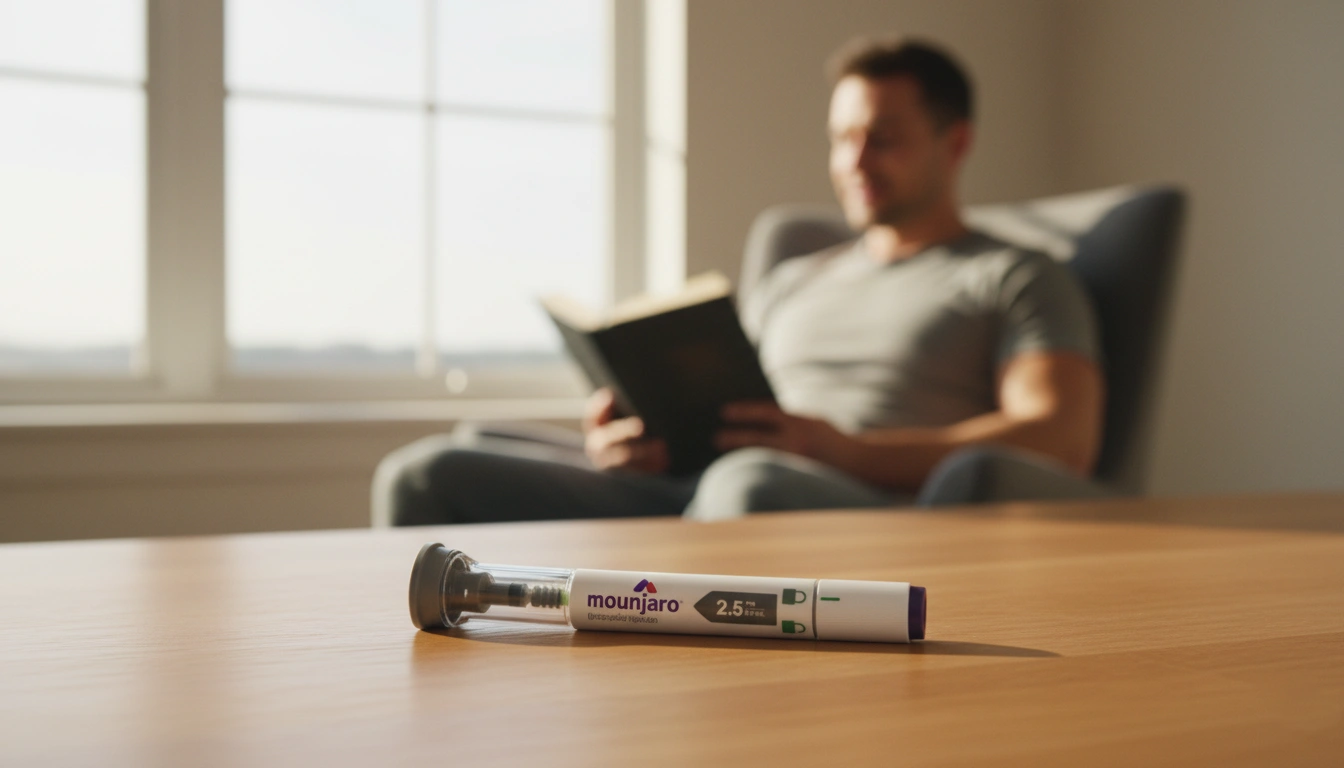Should I Eat Before Injecting Mounjaro? Understanding the Best Practices

Introduction
Have you ever wondered about the best practices surrounding medication injections, especially when it comes to timing with meals? For those of us utilizing Mounjaro (tirzepatide) as part of our weight management or blood sugar control journey, this question often arises: should I eat before injecting Mounjaro? Understanding this can be pivotal in ensuring we achieve the best results while minimizing potential side effects.
In the ongoing dialogue about effective weight loss and diabetes management, Mounjaro has emerged as a primary player, offering users a pathway to better control their appetite and blood sugar levels. However, as with any medication, the habits surrounding its administration can significantly impact its effectiveness. By the end of this post, we’ll explore the best practices regarding meal timing and Mounjaro injections, what the latest research suggests, and how we can optimize our experience with this medication.
Injectable medications can often be accompanied by a myriad of questions, particularly regarding their optimal use. Mounjaro, a relatively new medication, is positioned at the intersection of weight management and diabetes care. This dual benefit makes it essential to understand how our eating habits might influence its efficacy.
Did you know that Mounjaro mimics natural hormones that regulate appetite and glucose levels? This means that understanding how and when to take it in relation to food can enhance its effects. In this post, we’ll delve into the intricacies of Mounjaro injections and the implications of eating before or after administering the medication.
Our goal is to provide you with a clear understanding of whether eating prior to injection is necessary, along with practical tips that can help you integrate Mounjaro into your lifestyle seamlessly. We will cover topics such as:
- How Mounjaro works
- The relationship between Mounjaro and food intake
- Best practices for injection timing
- What to consider when planning your meals
- The importance of personalized care in your weight loss journey
By the end, you will have a comprehensive understanding of how to navigate your Mounjaro experience effectively, ensuring that you maximize its potential while maintaining your overall health.
How Mounjaro Works
Mounjaro (tirzepatide) is a GLP-1 receptor agonist that helps manage blood sugar levels in adults with type 2 diabetes. It operates by imitating hormones in the body that regulate appetite and glucose metabolism. This medication is typically injected once a week and is often prescribed alongside a balanced diet and regular exercise regimen to support weight loss.
The mechanism of action for Mounjaro involves:
- Appetite Regulation: Mounjaro signals the brain to promote feelings of fullness, helping users to eat less. This effect can be particularly beneficial for those struggling with overeating or cravings.
- Slowed Gastric Emptying: By slowing the rate at which food leaves the stomach, Mounjaro prolongs the feeling of fullness. This means you may find yourself satisfied with smaller portions.
- Blood Sugar Control: Mounjaro helps to lower blood sugar levels by enhancing insulin secretion and reducing glucagon levels, which is crucial for managing diabetes.
Understanding these mechanisms is essential as it lays the groundwork for discussing how our eating patterns might interact with Mounjaro’s effects.
The Relationship Between Mounjaro and Food Intake
One of the most frequently asked questions about Mounjaro is whether it should be taken before or after meals. The prescribing information for Mounjaro indicates that it can be injected with or without food. This flexibility can be advantageous for users as it allows for a more personalized approach to medication adherence.
Key Insights:
- No Food Restrictions: Clinical studies have shown that food does not significantly affect the pharmacokinetics of Mounjaro. This means that whether you eat before or after the injection does not alter how the medication works in the body.
- Personal Preference: Many individuals find that linking their injection time with mealtimes helps them remember to administer the medication. For instance, if you plan to inject Mounjaro before dinner, it may serve as a helpful reminder to take your dose consistently.
- Individual Sensitivity: While the medication can be injected without regard to meals, personal experiences may vary. Some users report feeling better when they don’t inject on an empty stomach due to potential gastrointestinal side effects like nausea.
Best Practices for Injection Timing
Establishing a routine for administering Mounjaro can significantly enhance your experience. Here are some best practices to consider:
- Choose a Consistent Day and Time: Mounjaro is administered once a week. Selecting the same day and time each week helps maintain stable blood levels of the medication.
- Link to Mealtime if Helpful: If you find it easier to remember your dose when associated with a meal, choose a regular mealtime. However, ensure that you don’t feel pressured to eat if you’re not hungry.
- Avoid Heavy Meals Immediately Before Injection: If you experience nausea or discomfort, it might be beneficial to avoid large meals right before your injection. Instead, opt for smaller, balanced meals throughout the day.
- Stay Hydrated: Adequate hydration is essential, especially while on Mounjaro. Drinking water before meals can help you feel fuller and can aid in digestion.
What to Consider When Planning Your Meals
While Mounjaro itself does not require strict dietary restrictions, being mindful of what you eat can enhance the effectiveness of the medication and support your overall health. Here are some dietary considerations:
- Prioritize Nutrient-Dense Foods: Focus on meals rich in lean proteins, whole grains, healthy fats, and plenty of fruits and vegetables. These food groups will help keep you satisfied longer and provide essential nutrients.
- Limit Sugary and Processed Foods: Reducing the intake of high-sugar and heavily processed foods can help stabilize blood sugar levels and improve weight management outcomes.
- Mindful Portions: Since Mounjaro helps regulate appetite, take advantage of this by practicing portion control. Eating smaller, more frequent meals can prevent overwhelming your digestive system.
The Importance of Personalized Care in Your Weight Loss Journey
At TrimRx, we understand that each individual’s journey is unique. Our commitment to personalized care means that we take the time to understand your specific goals, medical history, and lifestyle preferences. By providing tailored weight loss solutions and medically supervised care, we help you achieve sustainable results.
Why Personalization Matters
- Individual Assessment: Our free assessment quiz allows us to gauge your eligibility for prescription weight loss medications like Mounjaro. This personalized approach ensures that you receive the best possible care tailored to your needs. Take our free assessment quiz here!
- Ongoing Support: With TrimRx, you gain access to unlimited support from our medical team, who can provide guidance on meal planning, medication, and lifestyle changes.
- Holistic Approach: We believe in combining medication with a healthy diet and regular physical activity, creating a comprehensive strategy for weight management that aligns with your personal goals.
Conclusion
Navigating the complexities of medication administration can be daunting, but understanding the relationship between Mounjaro and meal timing can make a significant difference in your weight management journey. We’ve explored how Mounjaro functions, the flexibility of meal timing concerning injections, and the best practices for optimizing your experience with this medication.
Ultimately, whether you choose to eat before injecting Mounjaro or not, the focus should be on creating a routine that works best for you. By integrating a balanced diet, personalized medical care, and consistent injection practices, we can enhance the effectiveness of Mounjaro and support your overall health goals.
If you’re looking for additional support on your weight loss journey, consider our quick-access supplements like GLP-1 Daily Support and Weight Loss Boost to complement your efforts.
FAQ
Can I inject Mounjaro if I haven’t eaten?
Yes, Mounjaro can be injected with or without food. However, if you experience nausea, it may be helpful to eat something light first.
What happens if I forget to take Mounjaro?
If you miss a dose, inject it as soon as you remember on the same day. If it’s close to your next scheduled dose, skip the missed dose. Do not double up.
Are there side effects associated with Mounjaro?
Common side effects include nausea, vomiting, and loss of appetite. Many of these effects may lessen over time.
How can I ensure I’m making the right dietary choices while on Mounjaro?
Focus on a diet rich in whole foods, prioritize lean proteins and fiber, and consult with our medical team for personalized dietary advice.
How often do I need to see my doctor while on Mounjaro?
Regular follow-ups are recommended to monitor your progress and adjust your treatment plan as necessary. Always consult with your healthcare provider for personalized advice.
By understanding the nuances of Mounjaro and its relationship with our eating habits, we can take proactive steps toward achieving our health and wellness goals. Let’s embark on this journey together, armed with knowledge and support.

Transforming Lives, One Step at a Time
Keep reading
What Happens If You Stop Taking Mounjaro?
If you stop taking Mounjaro, your appetite will return to its pre-medication baseline within a few weeks, and most people regain a substantial portion…
Mounjaro Maintenance Dose: What Works Long-Term
Your Mounjaro maintenance dose is the dosage you stay on after reaching your weight loss goal, and it’s not always the same dose you…
How Long Can You Take Mounjaro?
You can take Mounjaro for as long as it continues to be effective, well-tolerated, and medically appropriate. There is no established maximum treatment duration….



